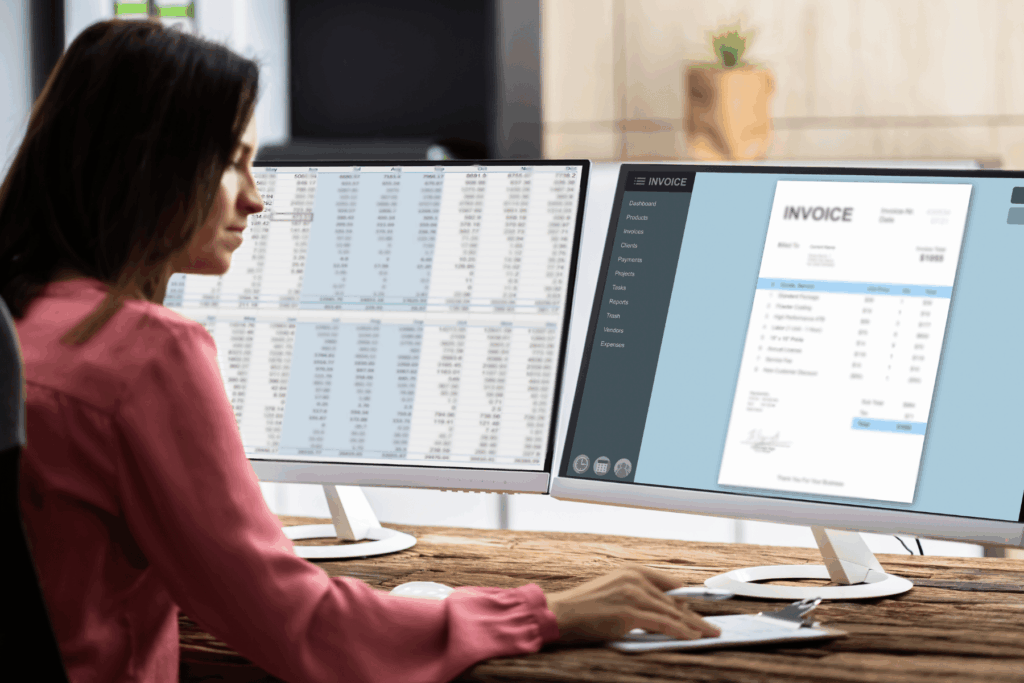When a company decides to implement a new ERP system, most of the attention goes straight to the software, what it can do, how fast it runs, and whether it checks all the boxes.
But here’s the part that rarely gets the spotlight: success rarely comes down to the platform alone. More often, it comes down to the people driving the implementation.
In the first episode of The Acumatica Playbook Podcast Darren Redies, COO at The Answer Company, breaks this down in simple terms. It’s not about flashy demos or polished sales pitches. It’s about working with someone who genuinely wants to understand your business, challenge your thinking in the right moments, and stick around long after the go-live celebration.
If you’re in the market for an ERP system, or wondering why your last one never quite lived up to the promise, then this post is for you. We’re walking through the traits of a good ERP implementation partner, the kind that doesn’t just install software but helps you build something that works, that lasts, and that actually propels your business forward.
What Real ERP Implementation Partnership Looks Like (And How to Spot It Early)
If you’ve ever sat through an ERP pitch, you’ve probably heard the word “partner” thrown around more than once. But what you call yourself and how you actually show up for clients are two very different things.
A good ERP implementation partner isn’t just there to install software. They’re there to help you rethink how your business runs, and that takes more than technical skill. It takes a real commitment to your goals, your people, and your success beyond go-live.
So how do you tell the difference early on? Pay attention to how the conversation unfolds.
They focus on business outcomes, not just scope.
Instead of diving straight into features or modules, they’ll ask about your goals. What needs to improve? What’s holding your team back? They use that context to shape the entire implementation.
They’re genuinely curious.
They want to talk to more than just the project lead. They’ll ask to hear from finance, operations, warehouse teams, anyone who will really use the system day to day.
They ask hard questions.
If you hand over a list of requirements and they just nod and take notes, that’s a red flag. A good partner will challenge assumptions, offer alternatives, and help you think through the impact of every decision.
They’re already thinking about what happens after go-live.
They won’t disappear once the system is live. They’ll bring up things like user adoption, optimization plans, and how your system needs to evolve as your business grows.
These are the signals that separate a consultant who’s just delivering a project from one who’s invested in your long-term success. And when you’re making a decision this big, that difference matters.
6 Traits of a Good ERP Implementation Partner
Choosing the right ERP implementation partner isn’t just about checking certifications or comparing hourly rates. The strongest partners show up with qualities that make the difference between a project that drags and one that delivers real results.
These six traits are what we’ve seen consistently in successful, long-term ERP relationships:
1. They lead with curiosity.
Before they touch a line of code or suggest a module, they ask questions. Not just what you want the system to do, but why. They dig until they understand how your business really works.
2. They know your industry.
This isn’t about general ERP experience. It’s about understanding your vertical—whether you’re in manufacturing, construction, distribution, or services—and recognizing the nuances that come with that.
3. They align the tech with your strategy.
A strong partner doesn’t just configure software. They help make sure your system supports where your business is going, not just where it is today.
4. They push back when it matters.
A yes-man doesn’t get you to the best outcome. A trusted partner will respectfully challenge decisions when needed, offering alternatives that might serve you better.
5. They’re still around after go-live.
The work doesn’t stop once the system is live. The right partner helps you optimize, adapt, and grow with the system as your business evolves.
6. They fit your culture.
This one’s often overlooked, but it matters. A team that communicates well with yours, shares your values, and works collaboratively will always get further than one that doesn’t.
If your prospective ERP partner doesn’t reflect most of these traits, it’s worth asking whether they’re really the right fit.
Key Questions to Ask Your ERP Implementation Partner
It’s easy for any consulting firm to say they’re collaborative, strategic, or industry-savvy. But when you’re about to make a major investment in ERP, you need more than polished sales talk. You need to know if this partner can truly support your business through the full journey.
The right questions can tell you a lot about how they work, how they think, and how they’ll show up when things get hard. These aren’t just checkbox questions. They’re meant to start the kinds of conversations that reveal how the partner will fit with your team and support your goals.
Here are some you should ask early:
- How do you approach discovery? Listen for signs that they want to understand your business deeply, not just gather requirements.
- What kind of experience do you have in our industry? Ask for specific examples. Generic ERP knowledge won’t help you if they don’t know your day-to-day challenges.
- What does support look like after go-live? If their answer is just a help desk number, that’s not partnership. Look for a clear approach to ongoing support and optimization.
- What happens when priorities shift mid-project? ERP projects evolve. You want a partner who can adapt and guide you through those changes without derailing the whole plan.
- Who will be on our team, and how often will we talk? Visibility matters. You need to know who’s accountable and how often you’ll be aligned throughout the process.
These questions won’t just help you evaluate technical capability. They’ll help you understand how the partner operates, what they value, and whether they’ll be a true ally for your business not just during the project, but long after it’s complete.
Why Partnership Drives ERP Success
The software matters, no question. But if you ask companies why their ERP project failed or why it exceeded expectations, they’ll rarely talk about features. They’ll talk about people.
The difference between a system that sits underused and one that fuels real change often comes down to the strength of the partnership behind it. When your ERP implementation partner knows your industry, respects your goals, and isn’t afraid to ask tough questions, you get more than a working system. You get a platform that actually helps your team do better work and propels your business forward.
At The Answer Company, we’ve worked with many clients for more than a decade, and the reasons they continue with us go far beyond system performance. Clients stick with us not just because the system does what it’s supposed to, but because we don’t disappear once it’s live. We stay involved, check in often, and keep finding ways to improve the way their business runs. That’s what partnership looks like in practice, not just being available when called, but being proactive.
That kind of relationship doesn’t happen by signing a contract. It’s built over time, through consistent support, honest conversations, and a shared focus on helping the business grow.
When ERP is implemented well, it doesn’t just improve processes. It gives leadership better insight, frees up employees to do higher-value work, and helps the entire organization move with more clarity and confidence. But none of that happens without the right people guiding the way.
How The Answer Company Delivers ERP Success
At The Answer Company, we’ve spent the last 30 years helping organizations choose, implement, and evolve ERP systems that do more than keep the lights on. We build systems that support growth, improve efficiency, and actually make people’s work easier. But the real reason clients choose to work with us (and stay with us) isn’t just our team’s technical expertise. It’s the way we partner.

We focus on a few core principles:
We ask better questions.
From the first conversation, we’re focused on how your business works today, and where you want it to go. We don’t rely on assumptions, and we don’t use a one-size-fits-all playbook.
We bring industry-specific experience.
Our teams specialize in sectors like manufacturing, distribution, construction, and professional services. That means we’re not starting from scratch. We bring relevant experience to the table, so we can move faster and avoid common pitfalls.
We’re structured for long-term support.
Go-live isn’t the end of the engagement. Our teams stay involved, helping you optimize, expand, and adapt the system as your needs change. That’s how we’ve delivered more than 3,000 successful ERP projects across Canada.
We stay people-first.
ERP should help people do their jobs better. We focus not just on systems and workflows, but on how the solution impacts the real people using it every day.
This isn’t just our method. It’s our mindset. We treat ERP as a long-term relationship, not a single project. And that mindset shows up in every phase from discovery to post-implementation optimization.
ERP Implementation Partner FAQs
An ERP implementation partner is a consulting firm that helps your business plan, configure, and deploy your ERP system. But a true partner does more than technical setup. They bring strategic insight, industry knowledge, and long-term support to ensure your ERP investment delivers real value.
Because ERP impacts every corner of your business. The right partner helps you align the system with your goals, avoid costly missteps, and keep improving long after go-live. The wrong partner might check the boxes but leave you with a system that doesn’t fit your operations.
Look for curiosity, experience in your industry, a proven process, strong post-launch support, and cultural fit. Pay attention to how they communicate, how they challenge your thinking, and whether they truly understand your business needs.
That depends on the partner. At The Answer Company, we view go-live as the starting line, not the finish. We continue to support system optimization, user adoption, upgrades, and strategic adjustments as your business evolves.
Yes. A skilled partner can step in to assess what’s not working, identify gaps, and realign the system with your original goals. We’ve helped many organizations rescue or improve implementations that fell short the first time.
Yes. We focus exclusively on Acumatica Cloud ERP, giving us deep expertise in its capabilities, integrations, and customization potential. This focus helps us deliver more precise, efficient, and scalable solutions across industries.



